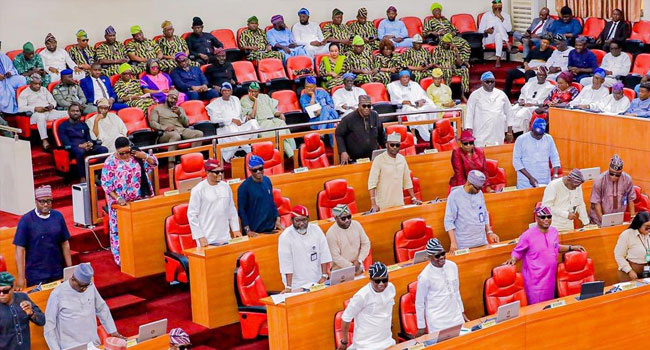
In an unprecedented move in recent history, Gov. Gretchen Whitmer will keep Michigan’s government operating as usual despite lacking constitutional authority to spend money without an approved budget.
The state government was slated to shut down at 12:01 a.m. Wednesday unless lawmakers passed a 2025-2026 spending plan or a temporary budget that would allow the state to keep paying its bills and obligations and maintain services.
Lawmakers failed to pass either budget Tuesday. Earlier in the day, Whitmer and legislative leaders said in a joint release that the full state spending plan would be finalized sometime “this week.” The Legislature has yet to present the plan.
In that release, Whitmer assured the public that all workers would be returning to work and that state services and operations would continue Wednesday uninterrupted while the budget is finalized.
No mention was made of how she would do that.
Majority Floor Leader state Rep. Bryan Posthumus, R-Rockford, confirmed to MLive that the state government will continue to operate uninterrupted and without layoffs or service reductions during the lapse in funding.
The expectation, Posthumus said, is that lawmakers will pass a final budget Wednesday evening or Thursday morning after the budget bill is drafted and reviewed.
The Michigan Constitution forbids expenditures by the state without an appropriation from the Legislature. The state can still incur expenses, and the state’s obligations, like paying workers and contracts, are staggered so that there won’t be a need to expend money in the brief lapse in funding, Posthumus said.
Whitmer’s office did not return a request for comment. Spokespersons for House Speaker Matt Hall, R-Richland Township, and Senate Majority Leader Winnie Brinks, D-Grand Rapids, did not immediately return requests for comment.
The Michigan Constitution states that “no money shall be paid out of the state treasury except in pursuance of appropriations made by law.” The last appropriations bill, or budget bill, approved by the Legislature expired Tuesday with the close of the 2024-2025 fiscal year.
“Tomorrow, state government will continue and work will go on in the legislature to finalize a balanced, bipartisan state budget this week,” Whitmer said Tuesday evening. “We’re on the verge of making huge progress to fix our state and local roads, feed our kids at school, cut taxes for seniors and working families, protect access to affordable health care and keep Michiganders safe in their communities.”
Earlier Tuesday, Whitmer notified the state’s tens of thousands of employees in an email that they would continue to work and be paid while the budget is finalized.
The last state shutdown was in 2009. Lawmakers quickly ended the shutdown by passing a temporary continuation budget.
The last time the state faced a shut down was in 2019. While a shutdown was ultimately avoided, the Whitmer administration outlined what nonessential services and operations would cease and sent out temporary layoff notices to state employees.
In the lead-up to Oct. 1, Whitmer and her office repeatedly declined to comment on what steps her administration would take in the event of a shutdown. The federal government is currently shut down due to a failure to pass a budget.
Despite the lack of an approved spending plan, Whitmer, Hall and Brinks said earlier Tuesday that they have reached an agreement on a budget plan that will be passed this week.
The budget bill, which has yet to be publicly unveiled, will include $1.5 billion in additional funding for roads, a continuation of free meals for public schoolchildren, record per pupil funding for schools, no taxes on tips, overtime pay and social security, a 26% wholesale tax on marijuana, an undisclosed amount of cuts to state departments and more.
Posthumus said that, as frustrating as it is that lawmakers have gone up to and then past the budget deadline, he thinks the people of Michigan will be proud of what the Legislature was able to accomplish with the budget, including tax cuts, greater transparency over legislatively-directed grants and a reduction in the size of government.
The floor leader was unable to provide the overall spending figures in the upcoming schools and government budget but said general fund spending would shrink by $800 million, down from the $14.9 billion in the prior budget.
The annual process of agreeing on a state budget to allocate dollars for schools, state departments, local governments and more is usually completed by July 1, the statutory deadline to pass a budget.
Lawmakers missed that deadline this year amid funding and policy differences, lower revenue projections and disagreements on a long-term funding plan to fix the state’s roads.
After months of stalled negotiations, Whitmer, Brinks and Hall announced last week that a budget deal was in place to pass a spending plan before Oct. 1.



